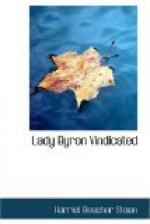She resolves to ask counsel of her lawyer, in view of a statement of the whole case.
Lady Byron is spoken of by Lord Byron (letter 233) as being in town with her father on the 29th of February; viz., fifteen days after the date of the last letter to Mrs. Leigh. It must have been about this time, then, that she laid her whole case before Lushington; and he gave it a thorough examination.
The result was, that Lushington expressed in the most decided terms his conviction that reconciliation was impossible. The language be uses is very striking:—
’When you came to town in about a fortnight, or perhaps more, after my first interview with Lady Noel, I was, for the first time, informed by you of facts utterly unknown, as I have no doubt, to Sir Ralph and Lady Noel. On receiving this additional information, my opinion was entirely changed. I considered a reconciliation impossible. I declared my opinion, and added, that, if such an idea should be entertained, I could not, either professionally or otherwise, take any part towards effecting it.’
It does not appear in this note what effect the lawyer’s examination of the case had on Lady Byron’s mind. By the expressions he uses, we should infer that she may still have been hesitating as to whether a reconciliation might not be her duty.
This hesitancy he does away with most decisively, saying, ’A reconciliation is impossible;’ and, supposing Lady Byron or her friends desirous of one, he declares positively that he cannot, either professionally as a lawyer or privately as a friend, have anything to do with effecting it.
The lawyer, it appears, has drawn, from the facts of the case, inferences deeper and stronger than those which presented themselves to the mind of the young woman; and he instructs her in the most absolute terms.
Fourteen years after, in 1830, for the first time the world was astonished by this declaration from Dr. Lushington, in language so pronounced and positive that there could be no mistake.
Lady Byron had stood all these fourteen years slandered by her husband, and misunderstood by his friends, when, had she so chosen, this opinion of Dr. Lushington’s could have been at once made public, which fully justified her conduct.
If, as the ‘Blackwood’ of July insinuates, the story told to Lushington was a malignant slander, meant to injure Lord Byron, why did she suppress the judgment of her counsel at a time when all the world was on her side, and this decision would have been the decisive blow against her husband? Why, by sealing the lips of counsel, and of all whom she could influence, did she deprive herself finally of the very advantage for which it has been assumed she fabricated the story?
CHAPTER IV. THE CHARACTER OF THE TWO WITNESSES COMPARED.
It will be observed, that, in this controversy, we are confronting two opposing stories,—one of Lord and the other of Lady Byron; and the statements from each are in point-blank contradiction.




